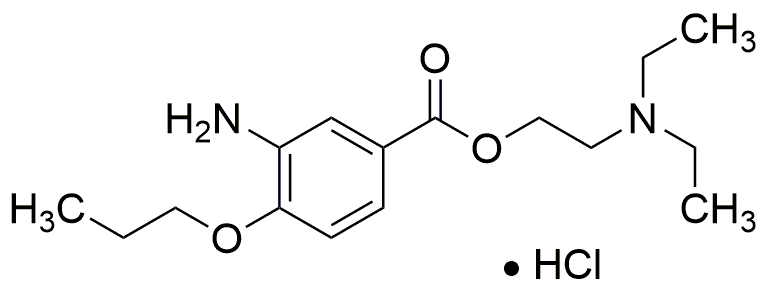Proparacaine hydrochloride is widely utilized in research focused on:
- Ophthalmic Anesthesia: This compound is primarily used as a local anesthetic in eye surgeries and procedures, providing quick and effective numbing to ensure patient comfort during operations like cataract surgery.
- Diagnostic Procedures: It is commonly employed in ophthalmology for procedures such as tonometry and gonioscopy, allowing for accurate eye examinations without discomfort to the patient.
- Research Applications: In laboratory settings, proparacaine hydrochloride is used to study the effects of local anesthetics on nerve conduction and pain pathways, aiding in the development of new pain management therapies.
- Veterinary Medicine: The compound is also applied in veterinary practices for eye procedures in animals, ensuring safe and effective anesthesia during treatment.
- Formulation Development: Researchers are exploring its potential in developing new formulations for sustained-release local anesthetics, which could enhance patient care by prolonging the duration of anesthesia.
Informations générales
Propriétés
Sécurité et réglementation
Applications
Proparacaine hydrochloride is widely utilized in research focused on:
- Ophthalmic Anesthesia: This compound is primarily used as a local anesthetic in eye surgeries and procedures, providing quick and effective numbing to ensure patient comfort during operations like cataract surgery.
- Diagnostic Procedures: It is commonly employed in ophthalmology for procedures such as tonometry and gonioscopy, allowing for accurate eye examinations without discomfort to the patient.
- Research Applications: In laboratory settings, proparacaine hydrochloride is used to study the effects of local anesthetics on nerve conduction and pain pathways, aiding in the development of new pain management therapies.
- Veterinary Medicine: The compound is also applied in veterinary practices for eye procedures in animals, ensuring safe and effective anesthesia during treatment.
- Formulation Development: Researchers are exploring its potential in developing new formulations for sustained-release local anesthetics, which could enhance patient care by prolonging the duration of anesthesia.
Documents
Fiches de données de sécurité (FDS)
La FDS fournit des informations de sécurité complètes sur la manipulation, le stockage et l’élimination du produit.
Spécifications du produit (PS)
Le PS fournit une description complète des propriétés du produit, notamment sa composition chimique, son état physique, sa pureté et les exigences de stockage. Il détaille également les plages de qualité acceptables et les applications prévues du produit.
Certificats d'analyse (COA)
Recherchez des certificats d'analyse (COA) en saisissant le numéro de lot du produit. Les numéros de lot et de lot se trouvent sur l'étiquette d'un produit, après les mots « Lot » ou « Lot de fabrication ».
Numéro de catalogue
Numéro de lot/série
Certificats d'origine (COO)
Ce certificat d'exploitation confirme le pays dans lequel le produit a été fabriqué, et détaille également les matériaux et composants utilisés et s'il est issu de sources naturelles, synthétiques ou autres sources spécifiques. Ce certificat peut être requis pour les douanes, le commerce et la conformité réglementaire.
Numéro de catalogue
Numéro de lot/série
Fiches de données de sécurité (FDS)
La FDS fournit des informations de sécurité complètes sur la manipulation, le stockage et l’élimination du produit.
DownloadSpécifications du produit (PS)
Le PS fournit une description complète des propriétés du produit, notamment sa composition chimique, son état physique, sa pureté et les exigences de stockage. Il détaille également les plages de qualité acceptables et les applications prévues du produit.
DownloadCertificats d'analyse (COA)
Recherchez des certificats d'analyse (COA) en saisissant le numéro de lot du produit. Les numéros de lot et de lot se trouvent sur l'étiquette d'un produit, après les mots « Lot » ou « Lot de fabrication ».
Numéro de catalogue
Numéro de lot/série
Certificats d'origine (COO)
Ce certificat d'exploitation confirme le pays dans lequel le produit a été fabriqué, et détaille également les matériaux et composants utilisés et s'il est issu de sources naturelles, synthétiques ou autres sources spécifiques. Ce certificat peut être requis pour les douanes, le commerce et la conformité réglementaire.

